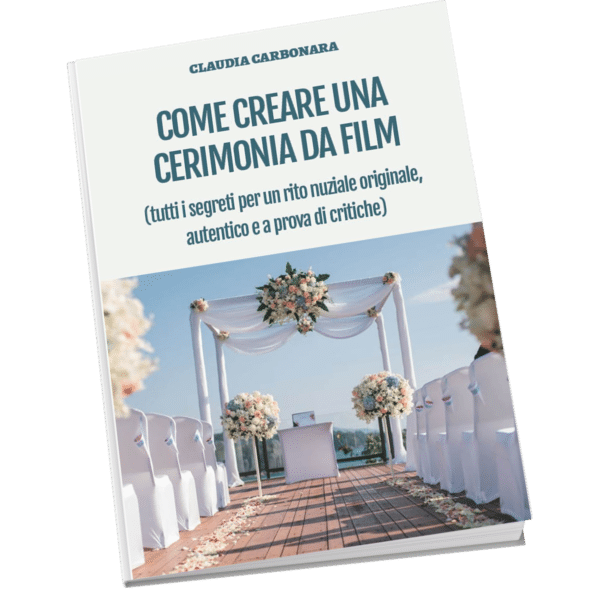![]() Shakespeare è uno degli autori più amati dalle coppie. Alcuni dei suoi versi sono perfetti come letture per la cerimonia civile o simbolica. Ecco la mia selezione. Se avete bisogno di aiuto con le letture per il vostro matrimonio contattatemi.
Shakespeare è uno degli autori più amati dalle coppie. Alcuni dei suoi versi sono perfetti come letture per la cerimonia civile o simbolica. Ecco la mia selezione. Se avete bisogno di aiuto con le letture per il vostro matrimonio contattatemi.
Sonetto 116
Non sia mai ch’io ponga impedimenti all’unione di anime fedeli;
Amore non è Amore se muta quando scopre un mutamento
o tende a svanire quando l’altro s’allontana.
Oh no! Amore è un faro sempre fisso
che sovrasta la tempesta e non vacilla mai;
è la stella-guida di ogni sperduta barca,
il cui valore è sconosciuto, benchè nota la distanza.
Amore non è soggetto al Tempo,
pur se rosee labbra e gote dovran cadere sotto la sua curva lama;
Amore non muta in poche ore o settimane,
ma impavido resiste al giorno estremo del giudizio:
se questo è errore e mi sarà provato,
Io non ho mai scritto, e nessuno ha mai amato.—
Sonetto 18
Devo paragonarti a una giornata estiva?
Tu sei più incantevole e mite.
Impetuosi venti scuotono le tenere gemme di maggio,
e il corso dell’estate è fin troppo breve.
Talvolta troppo caldo splende l’occhio del cielo
e spesso il suo aureo volto è offuscato,
e ogni bellezza col tempo perde il suo fulgore,
sciupata dal caso o dal corso mutevole della natura.
Ma la tua eterna estate non sfiorirà,
nè perderai possesso della tua bellezza;
nè morte si vanterà di coprirti con la sua ombra,
poichè tu cresci nel tempo in versi eterni.
Finchè uomini respirano e occhi vedono,
vivranno questi miei versi,
e daranno vita a te.—
Pene d’amor perdute (4.3)
Ma l’amore, che gli occhi di una donna per primi c’insegnarono a conoscere,
non vive solitario, straniato, murato nella cerchia del cervello;
ma, eccitando all’azione tutti i sensi, s’espande, rapido come il pensiero,
per ogni nostra facoltà vitale, dando a ciascuna una doppia energia, fuori dalle funzioni della prima.
Aggiunge all’occhio una seconda vista:
due occhi innamorati son capaci perfino d’abbagliar quelli d’un’aquila;
così come un orecchio innamorato è capace di percepire un suono talmente fioco
da poter sfuggire al sospettoso orecchio d’un ladrone;
la percezione d’un innamorato è più sensibile e più delicata di quella delle antenne della chiocciola;
è volgare al palato dell’amore, anche il gusto del raffinato Bacco.
E quanto ad ardimento, non è Amore un Ercole ancor sempre inerpicantesi sugli alberi dell’orto delle Esperidi?
Come sfinge sagace; dolce e armonico come la lira del fulgente Apollo, che ha per corde i capelli di quel dio.
E quando parla Amor, s’incanta il cielo all’armonia del coro degli dèi.
Poeta non ardisca toccar penna finché l’inchiostro suo non sia temprato nei sospiri d’amore:
solo allora i suoi versi raggiungono il potere d’incantare gli orecchi più selvaggi,
e di piantar nel cuore dei tiranni una mite umiltà.
Questa dottrina io derivo dagli occhi delle donne che sprizzano scintille senza posa sul fuoco di Prometeo;
e son loro i testi, le dottrine, le accademie che svelano, contengono, alimentano tutte le vere realtà del mondo,
senza le quali mai nessun mortale potrebbe eccellere in alcuna cosa.
![]() Shakespeare is one of the favourite writers for couples. Some of his verses are perfect as readings for the civil or symbolic wedding ceremony. This is my selection. If you need hel with the readings for your marriage contact me.
Shakespeare is one of the favourite writers for couples. Some of his verses are perfect as readings for the civil or symbolic wedding ceremony. This is my selection. If you need hel with the readings for your marriage contact me.
Sonnet 116
Let me not to the marriage of true minds
Admit impediments. Love is not love
Which alters when it alteration finds,
Or bends with the remover to remove:
O no! it is an ever-fixed mark
That looks on tempests and is never shaken;
It is the star to every wandering bark,
Whose worth’s unknown, although his height be taken.
Love’s not Time’s fool, though rosy lips and cheeks
Within his bending sickle’s compass come:
Love alters not with his brief hours and weeks,
But bears it out even to the edge of doom.
If this be error and upon me proved,
I never writ, nor no man ever loved.—
Sonnet 18
Shall I compare thee to a summer’s day?
Thou art more lovely and more temperate:
Rough winds do shake the darling buds of May,
And summer’s lease hath all too short a date:
Sometime too hot the eye of heaven shines,
And often is his gold complexion dimm’d;
And every fair from fair sometime declines,
By chance or nature’s changing course untrimm’d;
But thy eternal summer shall not fade
Nor lose possession of that fair thou owest;
Nor shall Death brag thou wander’st in his shade,
When in eternal lines to time thou growest:
So long as men can breathe or eyes can see,
So long lives this and this gives life to thee.—
Love’s Labour’s Lost (4.3)
But love, first learned in a lady’s eyes,
Lives not alone immured in the brain;
But, with the motion of all elements,
Courses as swift as thought in every power,
And gives to every power a double power,
Above their functions and their offices.
It adds a precious seeing to the eye;
A lover’s eyes will gaze an eagle blind;
A lover’s ear will hear the lowest sound,
When the suspicious head of theft is stopp’d:
Love’s feeling is more soft and sensible
Than are the tender horns of cockl’d snails;
Love’s tongue proves dainty Bacchus gross in taste:
For valour, is not Love a Hercules,
Still climbing trees in the Hesperides?
Subtle as Sphinx; as sweet and musical
As bright Apollo’s lute, strung with his hair:
And when Love speaks, the voice of all the gods
Makes heaven drowsy with the harmony.
Never durst poet touch a pen to write
Until his ink were temper’d with Love’s sighs;
O, then his lines would ravish savage ears
And plant in tyrants mild humility.
From women’s eyes this doctrine I derive:
They sparkle still the right Promethean fire;
They are the books, the arts, the academes,
That show, contain and nourish all the world:
Else none at all in ought proves excellent.


